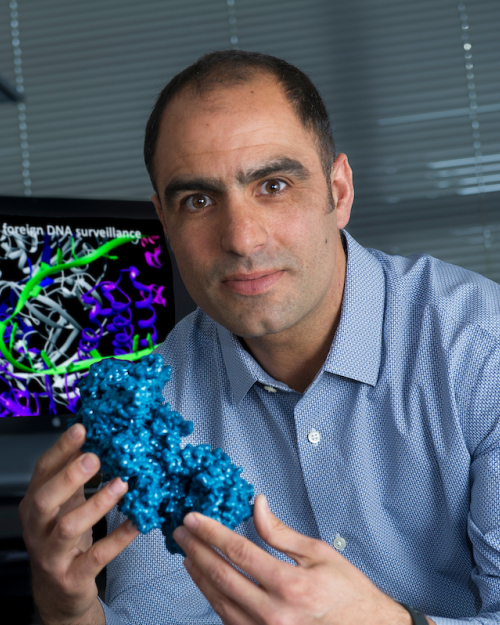Blake Wiedenheft, a scientist in the Montana State University College of Agriculture, has been named the university’s next endowed chair in plant science.
Wiedenheft will assume the position of Winifred Asbjornson Plant Sciences Chair on Aug. 15. He has been a faculty member for 13 years in the Department of Microbiology and Cell Biology, where he has received numerous accolades for pioneering discoveries that have led to transformative new applications in biotechnology.
Wiedenheft studies the immune systems that protect bacteria from viral infections. This research contributed to the discovery of what are known as CRISPR-Cas systems for precise genome engineering. Wiedenheft’s research is supported by the National Institutes of Health, and the products from that research have wide ranging uses, from testing for viruses to exploring treatments of genetic diseases. Last year he received agInnovation’s Agricultural Research and Innovation Award, and in 2017 he won a Presidential Early Career Award for Scientists and Engineers, one of the highest honors the U.S. government bestows to science and engineering professionals.
“I am excited to have Dr. Wiedenheft, one of the world’s foremost experts on gene editing, become the next Winifred Asbjornson Endowed Chair in Plant Sciences,” said Sreekala Bajwa, MSU’s vice president for agriculture and dean of the college. “He has a wealth of knowledge which, when applied to crop plants, will greatly benefit Montana’s major crops and our agricultural community at large.”
Wiedenheft, a Montana native, first arrived at MSU as an undergraduate and later returned as a graduate student to study viruses that thrive in the boiling acid environments of Yellowstone National Park. After graduating from MSU in 2006 with a doctorate in microbiology, Wiedenheft moved to the University of California, Berkeley, to train as a postdoctoral fellow in the lab of Jennifer Doudna on what would become the Nobel Prize-winning discovery of CRISPRs. In 2012, Wiedenheft and his partner, Michelle Flenniken, who is a professor in MSU’s Department of Plant Sciences and Plant Pathology, moved “home,” to MSU, where they each established their own research programs.
As endowed chair, Wiedenheft will build a research program aimed at understanding the wheat stem sawfly and developing new strategies to control the pest. Surveys conducted by the National Agricultural Statistics Service found that nearly a quarter of respondents in Montana had lost up to 10% of their yield to the pest, and total losses statewide for 2024 were estimated at $66 million.
“It is an incredible opportunity and tremendous responsibility to serve the farmers of this great state,” Wiedenheft said. “While my research team brings new tools and fresh perspectives, we also have a lot to learn from grain growers and scientific colleagues who have been working long and hard to mitigate pests and improve yields. The wheat stem sawfly is a formidable adversary, and finding sustainable solutions will demand creativity, collaboration and a deep commitment to Montana agriculture.”
Sustained by permanently invested funds, endowed chairs provide stable support to help universities build upon existing academic and research programs. The idea to establish an endowed chair in plant science emerged in 2013 with the goal of bringing a scientist to MSU to help Montana grain growers remain competitive and sustainable through research tailored for the state’s unique agricultural challenges. The MSU Alumni Foundation, Montana Grains Foundation and Montana Wheat and Barley Committee partnered with producers and agribusinesses to meet the $5 million fundraising goal for the chair, and MSU alumnus Norm Asbjornson gifted the endowment $2 million in 2017.
“The creation of this endowed chair reflects the generosity and vision of the Montana farmer,” Wiedenheft said. “The chance to partner with and learn from this community — and to do science rooted in real problems facing growers in this state — is a privilege. The challenges are complex and will require persistence, creativity and teamwork, but our work will be guided by collaboration and carried out in service to this place and its people.”

